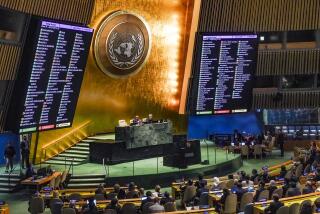6 More Months of Balkan Peacekeeping OKd
- Share via
UNITED NATIONS — The Security Council voted unanimously Monday to authorize six more months of peacekeeping for U.N. troops in the former Yugoslav federation but warned Serbia that sanctions against it would remain in place as long as Croatian Serb troops flouted cease-fire lines in Croatia.
The resolution passed after five days of delay due to an attempt by Russia, Serbia’s historic ally, to soften pronouncements against the Serbs. In the end, the resolution, though clouded by diplomatic compromise language, still made its disdain for Serbian actions clear.
The warning was underscored by U.S. Ambassador Madeleine K. Albright who told the Security Council: “The Serbian authorities must stop their interference in the internal affairs of Croatia.”
Sanctions were originally imposed on Serbia to prevent it from helping the Bosnian Serbs. The Bosnian Serbs have been accused of mass rapes and killings of Muslims as ethnic Serbians battle the ruling government of Bosnia-Herzegovina.
But the resolution admonished Serbia that “full normalization of the international community’s position towards those concerned will take into account their actions in implementing all relevant resolutions of the Security Council, including those relating to the U.N. peacekeeping plan for Croatia.”
Ambassadors said this was a complex, convoluted way of telling Serbia that the sanctions against it will remain in force, if it keeps meddling in Croatia.
In a speech to the General Assembly last week, President Franjo Tudjman of Croatia had insisted he would demand the withdrawal of all U.N. troops by Nov. 30 if Serb forces continued to violate cease-fire agreements with impunity.
The resolution attempts to deal with that by authorizing the U.N. peacekeepers to take all necessary measures, including use of force, to ensure that no one interferes with their movements in Croatia. Peacekeepers have been unable to maintain cease-fires between Croat and Serb separatists in the U.N. protected areas, set up under a plan mediated by former Secretary of State Cyrus R. Vance in 1992.
To assuage Tudjman, the resolution calls on Secretary General Boutros Boutros-Ghali to report in two months on whether the parties were adhering to Council resolutions on Croatia. The Council presumably could strengthen the U.N. mandate in Croatia, if he reported no improvement in the Serb conduct.
The United Nations now has 12,600 troops in Croatia, 10,000 in Bosnia and 1,000 in Macedonia--all part of a single operation covering U.N. forces in the former Yugoslav federation.
More to Read
Sign up for Essential California
The most important California stories and recommendations in your inbox every morning.
You may occasionally receive promotional content from the Los Angeles Times.













